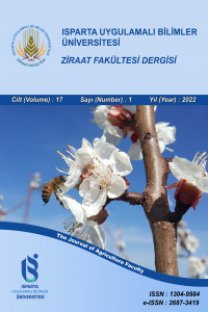Studies on the influence of doses of the plant bio stimulator and solid organic substrate on improving soil fertility
The paper presents the results obtained in a research project in which plant growth stimulators and bio fertilizers obtained by natural fermentation of plant remains wheat, barley, corn, sunflower and peas, under the influence of lignolitical microorganisms. Depending on the temperature, biodegradation may occur 7 to 14 days, after which extracts (infusion and soak) of medicinal and aromatic plants of the type Tagetes patula (marigold), Ocimum basilicum (basil green and red), Artemisia dracunculus (tarragon), Mentha piperita (peppermint), Thymus vulgaris (thyme), Lavandula angustifolia (lavender), Capsicum annuum (pepper). By squeezing the compost fermented to obtain the title compound (Biostimulator liquid - BIOSTIM) and a second product, represented by a solid organic substrate (generically called BRAISOL). 100% natural products, nutritional properties and to improve the metabolism of plants with increased tolerance to abiotic and biotic stress, facilitating the absorption of mineral elements, translocation and efficient use, improve the quality of agricultural and horticultural products. Bio fertilizers and bio stimulators produced from agricultural waste and herbs can be used with the methods of chemical fertilizer and the treatment of the cultures, as have been tested so far, but at the same time, they can be used in organic farming, where the organic waste from biological cultures. Both have the very high nutritional value for bio stimulator liquid, the concentration of active substance is from 15.25g / l, consisting of macro-, meso- and micro-nutrients to be added to the active principles of medicinal plants and for a solid organic substrate 58.97% concentration of mineral substances, which were determined in ashes. In this paper we are shown the beneficial effects that the two products have had on soil.
Studies on The Influence of Doses of The Plant Bio Stimulator and Solid Organic Substrate on Improving soil Fertility
The paper presents the results obtained in a research project in which plant growth stimulators and bio fertilizers obtained by natural fermentation of plant remains wheat, barley, corn, sunflower and peas, under the influence of lignolitical microorganisms. Depending on the temperature, biodegradation may occur 7 to 14 days, after which extracts (infusion and soak) of medicinal and aromatic plants of the type Tagetes patula (marigold), Ocimum basilicum (basil green and red), Artemisia dracunculus (tarragon), Mentha piperita (peppermint), Thymus vulgaris (thyme), Lavandula angustifolia (lavender), Capsicum annuum (pepper). By squeezing the compost fermented to obtain the title compound (Biostimulator liquid - BIOSTIM) and a second product, represented by a solid organic substrate (generically called BRAISOL). 100% natural products, nutritional properties and to improve the metabolism of plants with increased tolerance to abiotic and biotic stress, facilitating the absorption of mineral elements, translocation and efficient use, improve the quality of agricultural and horticultural products. Bio fertilizers and bio stimulators produced from agricultural waste and herbs can be used with the methods of chemical fertilizer and the treatment of the cultures, as have been tested so far, but at the same time, they can be used in organic farming, where the organic waste from biological cultures. Both have the very high nutritional value for bio stimulator liquid, the concentration of active substance is from 15.25g / l, consisting of macro-, meso- and micro-nutrients to be added to the active principles of medicinal plants and for a solid organic substrate 58.97% concentration of mineral substances, which were determined in ashes. In this paper we are shown the beneficial effects that the two products have had on soil.
___
- Andries, S., 2017, Organıc substance from Moldovan soıls and measures to ıncrease the fertılıty, Akademos 2/2017
- Blaga Gh., Filipov F., Rusu I., Udrescu S., Vasile D., 2005 - Pedologie, Editura AcademicPress, Cluj Napoca;
- Kennelly, M., O'Mara, J., Rivard, C., Miller, G.L. and D. Smith 2012. Introduction to abiotic disorders in plants. The Plant Health Instructor.
- Mihalache M, 2006 – Pedologie – geneza, proprietăţile şi taxonomia solurilor. Editura Ceres, Bucureşti
- Mihalache M. Ilie L., 2008 – Pedologie – Solurile României, Editura Dominor, Bucureşti;
- Tuteja Narendra*, Sarvajeet Singh Gill and Renu Tuteja, 2010. Plant Responses to Abiotic Stresses: Shedding Light on Salt, Drought, Cold and Heavy Metal Stress International Centre for Genetic Engineering and Biotechnology (ICGEB), Aruna Asaf Ali Marg, New Delhi - 110 067, India
- Udrescu S, Mihalache M., Ilie L., 2006 – Îndrumător de lucrări practice privind evaluarea calitativă a terenurilor agricole, AMC – USAMV Bucureşti
- Anuarul Statistic al Romaniei, 2010
- http://soco.jrc.ec.europa.eu
